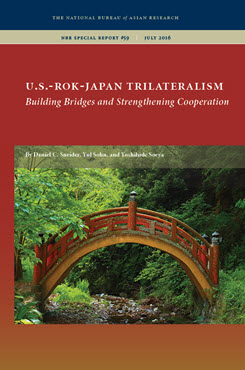The Future of Trilateral Cooperation
A Japanese Perspective
This essay examines the potential for trilateral cooperation between the U.S., Japan, and the ROK and argues that Japan and South Korea should take steps to strengthen the liberal international order through middle-power cooperation sustained by their U.S. alliance relationships.
EXECUTIVE SUMMARY
This essay examines the potential for trilateral cooperation between the U.S., Japan, and the ROK and argues that Japan and South Korea should take steps to strengthen the liberal international order through middle-power cooperation sustained by their U.S. alliance relationships.
MAIN ARGUMENT
Japan and South Korea face the complex task of managing their security relationships with the U.S. at the same time that power shifts between the U.S. and China. The strategic clash between Washington and Beijing could deprive both Tokyo and Seoul of the freedom of decision-making and action. Despite concerns in South Korea about Japanese “military expansion,” the new security legislation passed in the Diet in September 2015 has the potential to enhance the security of the Korean Peninsula. It would also allow Japan and South Korea to engage in close cooperation in the domain of nontraditional security. Yet the goal of such bilateral security cooperation would not be to contain or encircle China but to strengthen the liberal international order. Middle-power cooperation is the basis for both nations’ survival strategies in the short to medium term, and in the long run it should solidify the common ground on which they must coexist with a strong (or disorderly) China.
POLICY IMPLICATIONS
- Given that China will likely regard security cooperation between Japan and South Korea as directed against it, Tokyo and Seoul should be persistent in their efforts to ease Beijing’s concerns through extensive dialogue and concrete action.
- Policy consultations between Japan and South Korea should be institutionalized and strengthened. Resuming shuttle summit meetings on a regular basis should be a priority, as this step would prompt closer cooperation at the administrative level.
- The General Security of Military Information Agreement (GSOMIA) should be signed as soon as possible, and negotiation of the bilateral Acquisition and Cross-Servicing Agreement (ACSA) should resume immediately. The GSOMIA is important in the context of the North Korean problem, while the ACSA would be a useful tool for cooperation on nontraditional security.
- The U.S. should not interpret Japanese and South Korean conceptions of neutrality as anti-U.S. or detrimental to U.S. interests. For both Japan and South Korea, the role of their alliances with the U.S. is not to encircle China but to sustain a stable regional order.
Yoshihide Soeya is Professor of Political Science and International Relations at the Faculty of Law of Keio University.


